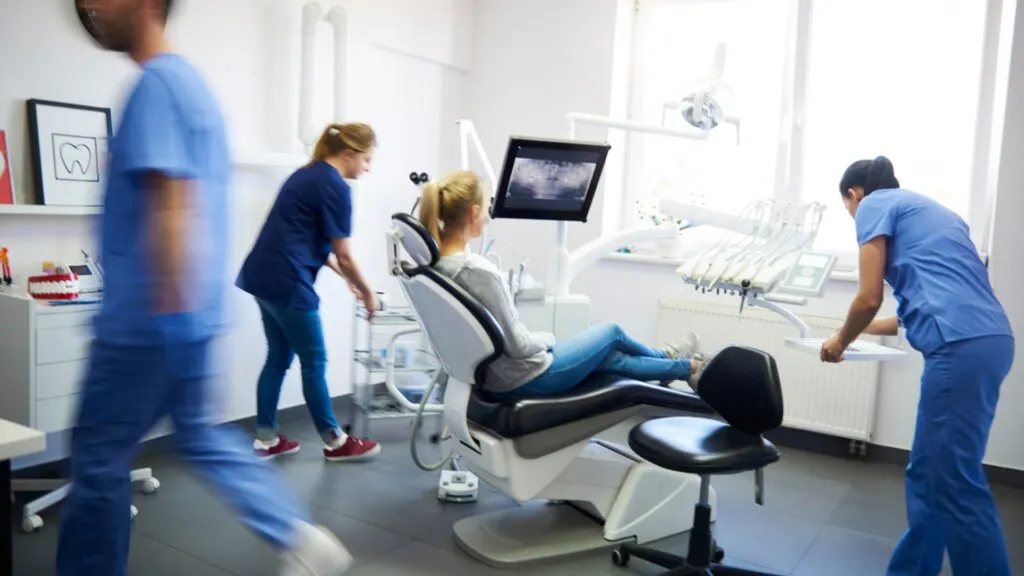If you’re a qualified dentist looking to expand your career in Europe, Germany offers excellent job opportunities with attractive benefits, high-quality healthcare standards, and a chance to work in a dynamic environment. This guide will walk you through the essentials of securing a dentist job in Germany, from qualifications and language skills to application tips.

Why Choose Germany for Your Dentistry Career?
Germany is one of Europe’s most advanced countries in healthcare, making it an ideal destination for medical professionals, including dentists. Here’s why working as a dentist in Germany can be a rewarding choice:
- High-Quality Work Environment: German dental clinics are well-equipped with state-of-the-art technology and follow international standards.
- Competitive Salary and Benefits: Dentists in Germany enjoy competitive pay, excellent benefits, and job security.
- Professional Growth Opportunities: With continuous professional development, dentists can specialize further or expand their skills.
- Rich Culture and Lifestyle: Germany offers a high standard of living, a rich cultural heritage, and a vibrant work-life balance.
Basic Requirements to Work as a Dentist in Germany
To start working as a dentist in Germany, you must meet certain prerequisites. Here’s a quick overview of what you need:
- Recognized Dental Degree: Your dental degree must be recognized by German authorities. If you obtained your qualification outside the EU, you may need to go through an equivalency assessment.
- Professional License (Approbation): Dentists must obtain a license called “Approbation” to practice in Germany. This is a mandatory certification issued by the German health authorities.
- German Language Proficiency: Proficiency in German (usually B2 or C1 level) is essential for dentist-patient communication and understanding medical terminology.
- Work Experience: While not mandatory, having prior experience can enhance your profile and increase your chances of securing a job in reputable clinics or hospitals.
- Additional Certifications (if applicable): Specializations or advanced dental certifications may further enhance your employability and potential salary.
Steps to Secure a Dentist Job in Germany
Here are the essential steps to help you land a dentist job in Germany:
Step 1: Evaluate and Authenticate Your Degree
To practice dentistry in Germany, non-EU citizens must have their dental degree recognized by German authorities. For this, you may need to provide:
- Transcripts and curriculum of your studies
- Proof of practical experience
- Any additional certifications or specializations
Step 2: Apply for Approbation (Professional License)
The “Approbation” is a critical certification for practicing as a dentist in Germany. The process may involve assessments and is usually conducted by the respective state health authority.
Step 3: Meet the German Language Requirement
German language proficiency is crucial for interacting with patients, medical staff, and handling documentation. You’ll typically need to clear a B2 or C1 level language exam to qualify.
Step 4: Update Your Resume and LinkedIn Profile
Make sure your resume and LinkedIn profile highlight your qualifications, experience, and relevant certifications. Tailor them to the German job market, emphasizing clinical experience, patient management, and any language skills.
Step 5: Start Your Job Search
You can find dentist job openings on German job portals such as StepStone, Indeed, or through specialized medical recruitment agencies. Networking on LinkedIn can also help you connect with employers in the field.
Benefits of Working as a Dentist in Germany
Once you’ve successfully navigated the application process, you’ll be in for some attractive benefits:
- Job Stability and Security: The healthcare sector in Germany is well-regulated and offers job security.
- Competitive Salary: Dentists in Germany earn a competitive income, with salaries typically ranging from €3,500 to €6,500 per month, depending on experience and location.
- Social Benefits: Dentists in Germany enjoy health insurance, retirement plans, and paid vacations.
- Opportunities for Further Training and Specialization: Germany encourages lifelong learning, allowing dentists to pursue further specialization to stay updated with medical advancements.
Tips to Increase Your Chances of Getting Hired
- Invest in German Language Courses: Even a few extra language skills can set you apart in the job market.
- Apply for Internship or Volunteering Opportunities: If you’re new to the country, consider internships or short-term contracts as a starting point.
- Network with Other Professionals: Attend dental seminars, webinars, and conferences in Germany to expand your network and stay updated with the latest practices.
- Consult a Recruitment Agency: Specialized recruitment agencies can help you find dentist job openings suited to your profile.
FAQs
Q1: Can I work in Germany as a dentist with only English language skills?
A: While English might help in international clinics, German proficiency is typically mandatory for licensing and patient interaction.
Q2: How long does it take to get the Approbation?
A: The process can take several months, depending on your qualifications and the state authority’s requirements.
Q3: Are there opportunities for specialization?
A: Yes, Germany encourages professional growth, and you can pursue further specialization in fields such as orthodontics, oral surgery, and periodontics.
Final Thoughts
Working as a dentist in Germany offers numerous professional and personal benefits, from stable job prospects and attractive pay to a high standard of living. While the process may seem extensive, thorough preparation and language skills can significantly ease your journey.
For more information on how to start your career as a dentist in Germany, reach out to Admission Germany at +49 1551 0112622 or email us at info@admissiongermany.de. Our team is here to assist you with guidance, documentation, and the support needed to turn your career aspirations into reality.


Recent Comments